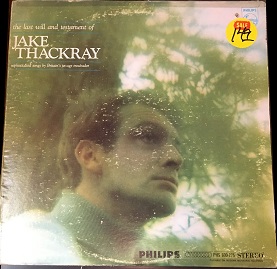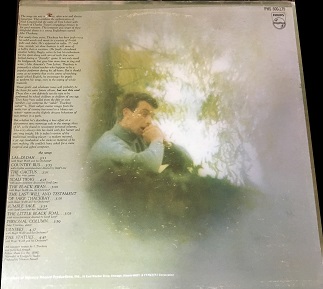The Atrocious Music Collection: #9 in a series
Artist: Jake Thackray (1938-2002)
Album Title: The Last Will and Testament of Jake Thackray
Category: Professional MusicianYear: 1967
Cover art style: Pensive. Or nauseous.
Audio samples:
- Jumble Sale
- Country Bus:
Acquisition: Tracks, Bloomington, IN ca. 1990


Click on pictures for full-sized images
To start with the headline:
At the first-ever Atrocious Music Party, it was Jake Thackray’s Country Bus, the second track on this album, which was voted the “Winner,” that is, the Most Atrocious Song.
Given that Yorkshire’s Jake Thackray, it turns out, had a respectful, if modest, career, including television appearances, while his competition that night included celebrities who couldn’t sing ruining beloved classics, unknown bands struggling to make a competent record, and a German-accented counter-tenor singing a disco version of Ding Dong the Witch is Dead, it might seem like a surprising result. Jake won, and Country Bus was encored three times. I guess you just had to be there.
Context, in the end, may be everything. The morning of the first-ever Atrocious Music Party, I went “binning” at Tracks Records and purchased The Last Will and Testament of Jake Thackray. In those pre-internet days, the album was an isolated artifact, devoid of context. It appeared to hold some promise as a new addition to the collection. There was the overly-pensive photo of Jake on the cover, tinted a somewhat sickening green, along with irresistible tag lines, likely put there by someone in marketing and not at all the sort of thing Jake would approve of. These lines, “sophisticated songs by Britain’s jet-age troubador [sic],” and calling Jake a “modern-day minstrel,” were just the right sort of suggestive bragging that could quickly morph into mockery.
There is no year on the recording, although there were signs of a mid-to-late-1960s vintage. We now know the album is from 1967. By 1967, the “modern-day minstrel” Bob Dylan had already released seven albums including The Freewheelin’ Bob Dylan, The Times They Are a-Chaingin’, and Highway 61 Revisited. If Thackray was a jet-age troubadour, Dylan was an alien from outer-space.
Reading the back-of-the-album text (next to the picture of Jake… biting his knuckles?) just makes things worse. Jake comes off as an amateur who primarily writes songs with the grade school English students he teaches. That these songs, the ones on this album, are touted as his “adult” songs, sets them up for further scrutiny on those grounds, and, in the end, the topics and lyrics don’t seem to warrant the warning that these “are definitely not the type to be performed by…children of any age.” Why not? For context, 1967 also brought us Let's Spend the Night Together and The Velvet Underground's I'm Waiting for the Man. Jake's songs, at worst, contain some heavy pub drinking.
So another compliment transformed into a put-down.
The comparison with Tom Lehrer, the only other artist mentioned in the liner notes, seems off-the-mark, and certainly doesn’t prepare one for what is on the record. There’s nothing of the biting satire of National Brotherhood Week or the Theme from Oedipus Rex here.
Add to all of this the collective ignorance of everyone at the first-ever Atrocious Music Party of what musical traditions a rural Northern-Englishman might be working within, let along the cultural landscape his words were reflecting. From a distance of many miles and many years, we were not likely to “get” any of this. Played in America, some 20-plus years after it was recorded, surrounded on the evening’s listening list by those tone-deaf celebrities and rock-star wanna-bes, it was no wonder we found it so… interestingly atrocious.
I apologize to Jake Thackray for our insensitivity.
However, in our defense…the songs tend towards list songs and the words are often tightly wound around a theme, often one that is quite specifically local. Jumble Sale is an example of the excesses of Thackray's style. The lyrics all reference items at a church jumble sale, even to the point of suggestive double-entendres regarding the real subject - the sales girl who he takes a fancy to:
Of the jumble sale, rough and tumble sale
Where ladies of the village fight like Visigoths for pillage.
Dear old jumble sale.
But behind the cut glass, brass and pewter pots
The plaster pussy cats, the china gnomes
I saw a girl, a wild eyed butterfly
Junoesque but shy
And just the thing for my
For my mantelpiece at home.
It gets worse when he finally gets to her, and finds himself “gawping at her pretty bibelots,” and looking forward to seeing “her bijoux and her gems/And her precious curios.”
Points to Jake for vocabulary, though.
County Bus, the winner, is deeply rooted in Thackray’s Northern England. It’s all pubs and rural public transport and drinking and bad country roads. The song moves through the four seasons of public drunkenness, ending with the bus itself experiencing the rebirth of spring:
You get the coal in your eyes and the snow up your nose.
But sooner or later
You will turn up in the village square
With daffodils in your gaiters
And pussy-willow in your hair.
What attracted us to it? The guitar’s imitation of the bus horn? The ear-worm refrain? The bits where Jake “digs in” a bit more with his voice? - such as on the line “We've got the springs in our backsides to ride out your bounce.” That this was advertised as his adult material?
Who knows – you can’t recreate a moment. It’s all about the local context, just like these songs.
